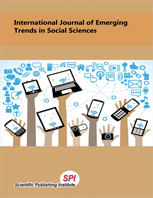Home Background, Peer Group Pressure and Truancy among Secondary School Adolescent Students in Edo State, Nigeria
DOI:
https://doi.org/10.20448/2001.31.46.51Keywords:
Truancy, Home background, Peer group pressure Gender.Abstract
This study examined the influence of home background, peer group pressure and truancy among secondary school adolescent students of Delta State. Three research questions and three hypotheses were formulated to serve as a guide to the study. Correlational survey research design was used for the study. The population of the study consists of all students in all public secondary schools in the area of the study. A sample of 266 students were used for the study using the simple random sampling technique. A 4 point likert scale questionnaire designed by the researcher was used for data collection. The questionnaire was validated by professionals in the area of research. Cronbach Alpha reliability was used to establish the reliability of the instrument with an r-value of 0.78. The statistical tools for answering the research questions and for testing the hypotheses were the Pearson r, coefficient of determination and the Analysis of Variance (ANOVA). The findings revealed that there is a significant relationship between home background and truancy among secondary school students. Also, there is a significant relationship between peer pressure and truancy among secondary school students. The study also revealed that there is no significant relationship between gender and truancy among secondary school students. Based on the findings, it was recommended among others that parents should learn to be close to their wards and as well take note of the friends that they associate with as this will help to reduce the level of peer influence on the development of truant behaviours among students, Teachers and parents should help in proper monitoring of student activities so as to help students to maximise their potentials to the fullest and to be well adjusted in all ramification of lives. Finally every parents and elder siblings should see themselves as role models that engender good behaviours to their children as the kind and form of mentoring given by parents contributes in the sharpening of adolescent attitudes and behaviours.


